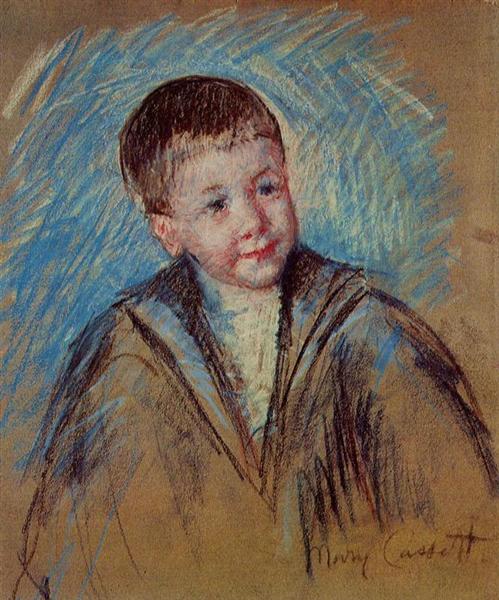Description
Mary Cassatt, renowned for her contribution to the Impressionist movement, creates in "Portrait of Master St. Pierre - 1892" a work that goes beyond a simple portrait; it is a profound invitation to unravel the complexity of perception and intimacy. In this painting, Cassatt presents her teacher, who was an influential figure in her artistic formation. The portrait reflects the relationship of respect and admiration that Cassatt felt for St. Pierre, which translates into an intimate and carefully composed representation.
The central figure, Master St. Pierre, is depicted in a setting that evokes both the warmth and depth of his character. The master’s posture is upright, suggesting a quiet dignity, and his soft, contemplative expression conveys an immediate connection with the viewer. Cassatt uses a rich but subtle color palette; earthy tones and grays predominate, contrasting with areas of lighter light that illuminate part of his face and some of his clothing. This color choice gives the portrait an almost dreamlike atmosphere, in keeping with the elusive nature of time and memory.
The composition is extremely careful, with St. Pierre positioned slightly off-center, which brings about a sense of dynamism in the work. All around him, there is an atmosphere of lightness, emphasized by details in the background that do not distract the viewer's eye from the main subject, allowing attention to be focused on the master himself. The application of paint is characteristic of Cassatt's Impressionist style, where the loose strokes and blending of colors seem to capture the natural light, imbuing the figure with an almost living quality.
Mary Cassatt is known for her focus on female representation and their interactions in everyday life, but in this portrait, she transcends her usual subject matter, approaching the male figure in a way that reveals her ability to explore the psychology of her subjects regardless of their gender. The gesture of painting St. Pierre not only represents an authority figure in her life, but also pays homage to the teaching and influence he had on her development as an artist.
"Portrait of Master St. Pierre - 1892" can be seen as a bridge between the tradition of portraiture and the search for a new visual consciousness that characterizes Impressionism. The work is part of a broader practice of portraits of contemporaries and mentors, each full of nuances and enunciations of the relationship between the portraitist and his subject. In this sense, the work also invites reflection on the artist's position in the art world, exploring his self-identification in relation to those who influenced his journey.
When analyzing this work, it is vital to recognize how Cassatt uses portraiture to express not only the physical appearance of Master St. Pierre, but also the emotional atmosphere and significant legacy he left behind. This masterpiece is a testament to Cassatt’s talent and her ability to capture the essence and complexity of the people around her, providing the viewer with a moment of introspection about the enlightenment that comes from shared teaching and respect in art.
KUADROS ©, a famous painting on your wall.
Hand-made oil painting reproductions, with the quality of professional artists and the distinctive seal of KUADROS ©.
Painting reproduction service with satisfaction guarantee. If you are not completely satisfied with the replica of your painting, we will refund 100% of your money.

